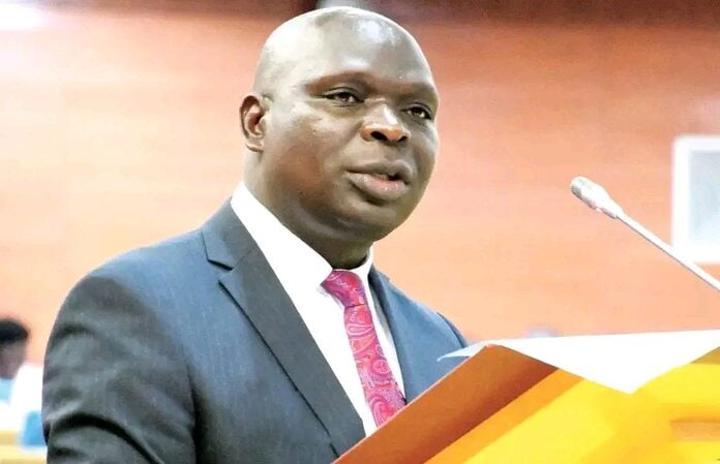Africa-Press – Ethiopia. Few days ago, news was awash with the suspension of ECF by IMF. We caught up with the Minister of Finance Simplex Chithyola to explain what has really transpired.
Q: Minister, could you elaborate on the reasons behind the mutual suspension of the ECF between Malawi and the IMF?
A: The suspension was a strategic, mutual decision with the IMF. While the ECF was designed to support our economic reforms, some proposed measures—such as further currency devaluation, increased utility tariffs, wage cuts, and a hiring freeze—posed risks to the welfare of Malawians. Our priority is a people-centered recovery. After comprehensive consultations, both sides agreed to pause the program to realign strategies.
Q: Some perceive this suspension as a breakdown in relations with the IMF. How would you respond?
A: That perception is incorrect. Our partnership with the IMF remains robust and collaborative. The suspension is a temporary pause—not a termination—allowing Malawi to stabilize internal policies and focus on the upcoming elections. We intend to revisit the program post-election, with the aim of ensuring alignment with national priorities.
Q: The IMF disbursed an initial tranche following the 2023 devaluation. What subsequent recommendations were seen as misaligned with Malawi’s context?
A: After the 2023 devaluation, the IMF recommended additional policy actions, including further devaluation, fuel and electricity tariff hikes, wage reductions, and a public sector hiring freeze. While these are standard macroeconomic tools, their implementation under current conditions could deepen hardship for ordinary citizens. Our analysis suggested they might hinder both social cohesion and economic recovery.
Q: How did the government respond to the immediate effects of the 44% kwacha devaluation in late 2023?
A: When I took office shortly after the devaluation, I prioritized measures to cushion its impact. We worked with stakeholders to safeguard essential services, redirected budget allocations to support vulnerable sectors, and introduced fiscal adjustments to stabilize the economy—all while maintaining our reform momentum.
Q: What specific steps were taken to shield vulnerable populations from inflationary pressures?
A: We strengthened social safety nets, preserved essential public services, and engaged civil society and private actors to monitor inflation. Additionally, we focused on securing stable supplies of basic goods to prevent shortages and price surges.
Q: Is Malawi moving away from externally driven reforms?
A: Not at all. We deeply value our partnerships with institutions like the IMF. However, we believe reforms must reflect our unique socio-economic realities. Our goal is to align external support with national priorities, fostering inclusive and sustainable growth.
Q: How is the government balancing macroeconomic stability with protecting livelihoods and services?
A: It’s a delicate balancing act. We’re pursuing prudent fiscal policies while ensuring priority funding for health, education, and social protection. Ongoing dialogue with stakeholders helps us fine-tune policies that meet both macroeconomic and human development goals.
Q: What lessons can Malawi draw from countries like Mozambique and Kenya that recalibrated their reform pathways?
A: Those countries highlight the importance of flexibility. Key takeaways include aligning reforms with local contexts, engaging all stakeholders, and maintaining open dialogue with international partners. These strategies often yield more sustainable and impactful reforms.
Q: How does suspending the ECF during the election period support policy stability?
A: Election periods often bring heightened political focus. Pausing the ECF allows us to maintain policy continuity without external pressure. Post-election, we’ll be better positioned to re-engage the IMF with a clear mandate and a stable policy framework.
Q: What assurances can you give stakeholders about Malawi’s reform and fiscal discipline commitments?
A: Our commitment is steadfast. We continue to implement reforms that promote transparency, accountability, and efficient resource use. Our fiscal strategies are aimed at long-term sustainability and economic resilience.
Q: Do you foresee re-engaging with the IMF after the elections? Under what terms?
A: Yes, we plan to re-engage post-election. Our goal is to negotiate terms that are mutually beneficial and aligned with our development agenda—ensuring that support received translates into real improvements in people’s lives.
Q: How does the ECF suspension affect current development programs and donor-supported initiatives?
A: While some funding may be delayed, we are actively coordinating with our development partners to maintain momentum on critical programs. Many understand our position and remain committed to Malawi’s development journey.
Q: What alternative sources of support is the government exploring during this period?
A: We are diversifying our economic partnerships through bilateral and regional financing channels. We’re also ramping up domestic revenue mobilization and encouraging private sector investment to reduce reliance on external aid.
Q: What is the government’s strategy to address the foreign exchange crisis?
A: We’re implementing measures to boost exports, attract foreign investment, and manage imports more effectively. We’re also negotiating debt restructuring and seeking concessional financing to ease pressure on foreign exchange reserves.
Q: Finally, what message do you have for Malawians concerned about the country’s economic future?
A: I want to reassure all Malawians that we are committed to building a stable and prosperous nation. While challenges remain, our strategies focus on inclusive growth, social protection, and long-term development. Together, we will navigate this journey and build a resilient, people-driven economy.
For More News And Analysis About Ethiopia Follow Africa-Press






